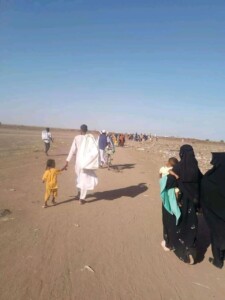UNHCR concerned over humanitarian situation of South Sudanese refugees in Khartoum
The representation of the UN refugee agency (UNHCR) in Sudan is concerned about “the inadequate response to the humanitarian needs of South Sudanese refugees in Khartoum”. In a statement from Khartoum today, the agency laments that “over the past few months, thousands of refugees have been relocated or had their shelters demolished without adequate planning and consultation with the communities”.
The representation of the UN refugee agency (UNHCR) in Sudan is concerned about “the inadequate response to the humanitarian needs of South Sudanese refugees in Khartoum”. In a statement from Khartoum today, the agency laments that “over the past few months, thousands of refugees have been relocated or had their shelters demolished without adequate planning and consultation with the communities”.
The UNHCR statement asserts that the latest reports indicate that some 220 shelters in Dar Es-Salam’s open area were removed by police on 23 October, reportedly leaving some 2,000 South Sudanese refugees without shelter. Other refugees have been relocated to Bantiu site in Jebel Auliya locality and Naivasha site in Omdurman where inadequate reception planning has resulted in over-crowding, inadequate shelter, and over-stretched water and sanitation facilities.
“UNHCR has welcomed an initial visit jointly held by the Government and the UN in late August 2017 to Bantiu site in Jebel Auliya locality to make a general assessment of the situation of the South Sudanese refugees. That visit witnessed clear and urgent humanitarian needs in water, sanitation, shelter, health and education. Planning is underway for a more detailed Government – interagency assessment of the open areas in Khartoum state. A rapid assessment, supported with full access, will allow UNHCR and other actors to start providing much needed support.
Sustainable options
“UNHCR acknowledges the Government of Sudan’s wish to find more sustainable options for hosting South Sudanese refugees who are currently living in “open areas” in Khartoum state and stands ready to discuss those options, bearing in mind the importance of a consultative process with key stakeholders including the refugee communities. Pending these longer-term options, UNHCR is hopeful that the immediate humanitarian needs of the South Sudanese refugees in Khartoum will be addressed in a timely manner to avoid unnecessary suffering. In order to address the immediate and longer-term needs of South Sudanese refugees in Khartoum, agencies will also require donor support.
“Across states, UNHCR is working to assist Sudan’s refugee response through providing basic services for over 450,000 South Sudanese refugees verified as newly arrived in the country since 2013, in partnership with the Commission for Refugees. UNHCR commends Sudan’s generous and open policy for hosting a large number of refugees.”
The statement concludes that the Government of Sudan estimate is that there are some 1.3m South Sudanese refugees in the country. UNHCR says it is working with Sudan to ensure all these refugees are captured through registration.











 and then
and then